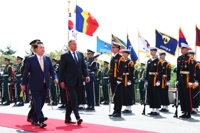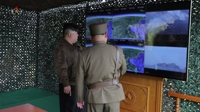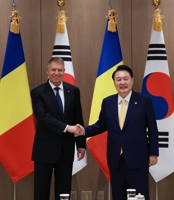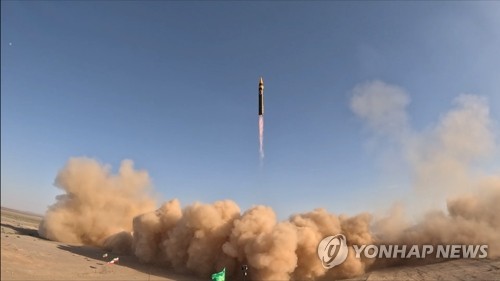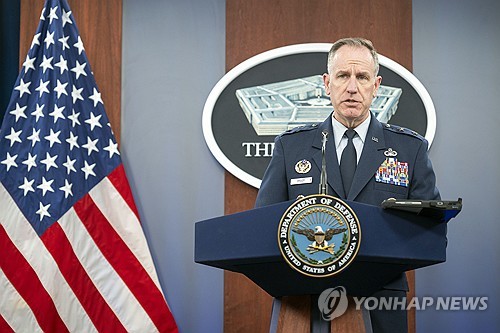(6th LD) Rouhani hints Iran’s opposition to N. Korea’s nuclear program
(ATTN: UPDATES with comments by presidential official; Minor edits)
By Kim Kwang-tae
TEHRAN, May 2 (Yonhap) -- South Korean President Park Geun-hye met with Iran's supreme leader, Ayatollah Ali Khamenei, on Monday, a move that could set the tone for relations between the two countries.
Park and Khamenei were expected to discuss how to boost bilateral relations, South Korea's presidential office said before the meeting. No details of the talks were immediately available.
The meeting came hours after Park held summit talks with Iranian President Hassan Rouhani in the first meeting between the leaders of the two countries since the establishment of bilateral diplomatic relations in 1962.
Rouhani suggested that his country is opposed to North Korea’s nuclear weapons program, joining growing international pressure on the communist country to pursue denuclearization and end its provocations.
"We want peace and stability on the Korean Peninsula and we are, in principle, opposed to any nuclear development," Rouhani said through a translator in a joint news conference with Park after their summit in Tehran. “Our basic position is that nuclear weapons should be removed from the Korean Peninsula and the Middle East."
South Korea hopes that North Korea will follow in the footsteps of Iran in curbing its nuclear activities and joining the international community.
North Korea has said it is different from Iran, rejecting calls for an Iran-style solution to Pyongyang’s nuclear program. North Korea claims that it is a nuclear weapons state and views its nuclear program as a powerful deterrent against what it claims is Washington's hostile policy towards it.
Iranian officials said they were surprised by Rouhani’s strong rhetoric on denuclearization, said a South Korean official, who is in a position to know Iranians’reactions.
Park said she called for Iran’s cooperation in the faithful enforcement of U.N. sanctions imposed on North Korea for its fourth nuclear test and a long-range rocket launch earlier this year.
Still, it remains unclear whether Rouhani made any comments on Park’s request.
Speculation has grown that North Korea could carry out a fifth nuclear test to mark a rare congress of the ruling Workers' Party scheduled for Friday.
South Korea and Iran also issued a joint statement and said they "reaffirmed their commitment to the NPT and denuclearization," referring to the Nuclear Nonproliferation Treaty meant to prevent the spread of nuclear weapons while promoting the peaceful use of atomic energy.
North Korea withdrew from the treaty in early 2003 after the current nuclear crisis broke out in late 2002 with revelations that it was running a secret uranium enrichment program.
Park said South Korea and Iran agreed to hold a meeting of foreign ministers and a bilateral joint economic commission meeting every year to boost diplomatic and economic cooperation.
The trade volume between Korea and Iran stood at US$6.1 billion in 2015, compared with $17.4 billion in 2011. Rouhani said the two countries could boost bilateral trade to more than $30 billion in five years.
"We agreed to cooperate with each other to restore bilateral trade and investment to ensure Iran can quickly rebuild its economy and its economic growth will be back on track,” Park said.
Iran, which has 80 million people, has emerged as a promising market as it is pushing to rebuild an economy and modernize railways and other major infrastructure following the lifting of international sanctions earlier this year.
The U.N. lifted sanctions on Iran in a follow-up to a nuclear deal reached with the United States and five world powers over Tehran's disputed nuclear program.
More than 230 South Korean business executives and leaders have accompanied the president on her state visit to the Islamic Republic to explore new business opportunities.
"We hope that South Korean companies will do business in various sectors in Iran,”Rouhani said.
Park and Rouhani observed the signing of nearly 20 out of 66 MOUs after their summit.
The two sides reaffirmed their commitment to further promote the existing bilateral relations in diverse areas, and agreed to develop a comprehensive partnership, according to the joint statement.
Seoul hopes the MOUs boost bilateral trade and pave the way for South Korea to eventually win massive infrastructure projects under way in Iran.
Cheong Wa Dae, South Korea's presidential office, described the MOUs as major economic accomplishments.
An Chong-bum, senior presidential secretary for economic affairs, said the MOUs could help South Korea boost bilateral trade.
A South Korean company signed a preliminary deal with its Iranian counterpart worth $5.3 billion to build a 541-kilometer-long track bed for a railway.
Cheong Wa Dae said the preliminary deal could boost the chance of inking a formal deal down the line.
The MOUs also include a $10 billion project by a South Korean consortium to build facilities to produce heavy oil in the southern Iranian port city of Bandar Jask.
The two sides decided to expand trade in energy, including oil and gas, while sharing views on the importance of cooperation in health and medicine to improve public health, agreeing to expand South Korea’s participation in Iran’s hospital construction projects, according to the joint statement.
Park said South Korea and Iran will set up their cultural centers in Seoul and Tehran to boost cultural and personnel exchanges between the two countries.
The two sides designated 2017 as the year of cultural exchanges between the two countries.
entropy@yna.co.kr
(END)
-
 Overdue debut of Korean abstract art pioneer Yoo Young-kuk at Venice Biennale
Overdue debut of Korean abstract art pioneer Yoo Young-kuk at Venice Biennale -
 Relax, immerse yourself in scents at Venice Biennale's Korean Pavilion
Relax, immerse yourself in scents at Venice Biennale's Korean Pavilion -
 S. Korea marks 30th anniv. of Korean Pavilion at Venice Biennale with contemporary art
S. Korea marks 30th anniv. of Korean Pavilion at Venice Biennale with contemporary art -
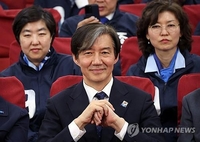 Ex-Justice Minister Cho slams Yoon's statement on crushing election defeat
Ex-Justice Minister Cho slams Yoon's statement on crushing election defeat -
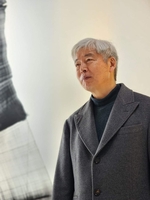 Artist Lee Bae captures ethereal Korean aesthetics at Venice Biennale
Artist Lee Bae captures ethereal Korean aesthetics at Venice Biennale
-
 Overdue debut of Korean abstract art pioneer Yoo Young-kuk at Venice Biennale
Overdue debut of Korean abstract art pioneer Yoo Young-kuk at Venice Biennale -
 Relax, immerse yourself in scents at Venice Biennale's Korean Pavilion
Relax, immerse yourself in scents at Venice Biennale's Korean Pavilion -
 Artist Lee Bae captures ethereal Korean aesthetics at Venice Biennale
Artist Lee Bae captures ethereal Korean aesthetics at Venice Biennale -
 S. Korea marks 30th anniv. of Korean Pavilion at Venice Biennale with contemporary art
S. Korea marks 30th anniv. of Korean Pavilion at Venice Biennale with contemporary art -
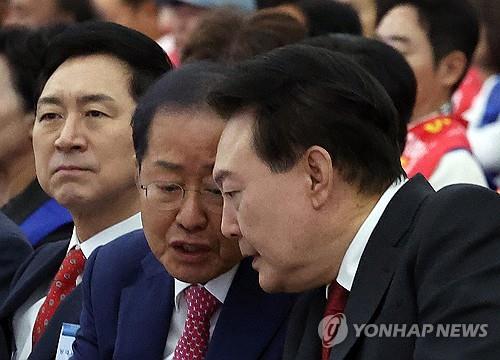 Yoon, Daegu mayor met to discuss post-election matters: sources
Yoon, Daegu mayor met to discuss post-election matters: sources
-
 Hybe says spinoff attempt by subsidiary label revealed clearly
Hybe says spinoff attempt by subsidiary label revealed clearly -
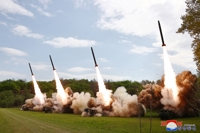 (LEAD) N. Korea says Kim guided simulated nuclear counterattack drill
(LEAD) N. Korea says Kim guided simulated nuclear counterattack drill -
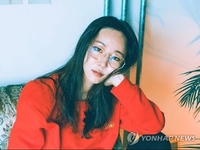 Hybe launches audit into NewJeans' label ADOR over alleged independence move
Hybe launches audit into NewJeans' label ADOR over alleged independence move -
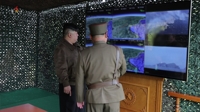 S. Korea warns N. Korea will face end of regime if it uses nuclear weapons
S. Korea warns N. Korea will face end of regime if it uses nuclear weapons -
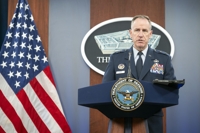 Pentagon stresses close consultation with S. Korea after simulated N.K. 'nuclear counterattack' drill
Pentagon stresses close consultation with S. Korea after simulated N.K. 'nuclear counterattack' drill















